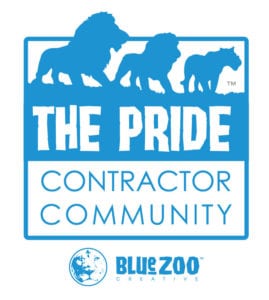The Blue Zoo Process: Part 2
Building the Team
Introduction
In our last post, we explained how core members of the Blue Zoo team work closely with you to discover your needs. The next step is for the Chief Culture Officer, Megan Tucker, to match your projects to our contractors.
The Pride
 Members of Blue Zoo management meet with The Pride. The Pride is a creative group of professional who love their field so much that what seems mundane to outsiders is truly exciting to them. These enthusiastic contractors will be working on your project. A team could include the following: web designer, web developer, videographer, content writer, SEO specialist, social media specialist and photographer.
Members of Blue Zoo management meet with The Pride. The Pride is a creative group of professional who love their field so much that what seems mundane to outsiders is truly exciting to them. These enthusiastic contractors will be working on your project. A team could include the following: web designer, web developer, videographer, content writer, SEO specialist, social media specialist and photographer.
When putting together a project team, we look for contractors who have a skillset that is a good fit for the project at hand, as well as a connection to the subject matter when possible. Once we find out what a client is passionate about, we match them with contractors whose passions align with exactly what the client needs.
Pride members are dedicated to their field, and we select them by their ability to self-manage, passion for the industry and capability to hit deadlines. These are only a few of the necessary characteristics for our contractors; others include integrity, dedication to growth, and the capacity to embrace obstacles with critical thinking skills and a can-do attitude.
We also have a list of expectations that Pride members can hold us accountable to, and vice versa. This give-and-take relationship ensures a family feel, which is increased by our dedication to do great work and make great things.
Why We’re Different
Blue Zoo Creative embraces this unique business model because it allows flexibility of time and workload for our contractors, thus keeping them happy, healthy and growing. Plus, we have found that people work better when they are passionate, so we do our best to use everyone’s strengths to the best advantage.
The extra attention we give to building a team is to ensure that you get the best possible service. With attention to detail, passion for the work and dedication to professionalism, we strive to do the best work possible.
Let the work begin!


